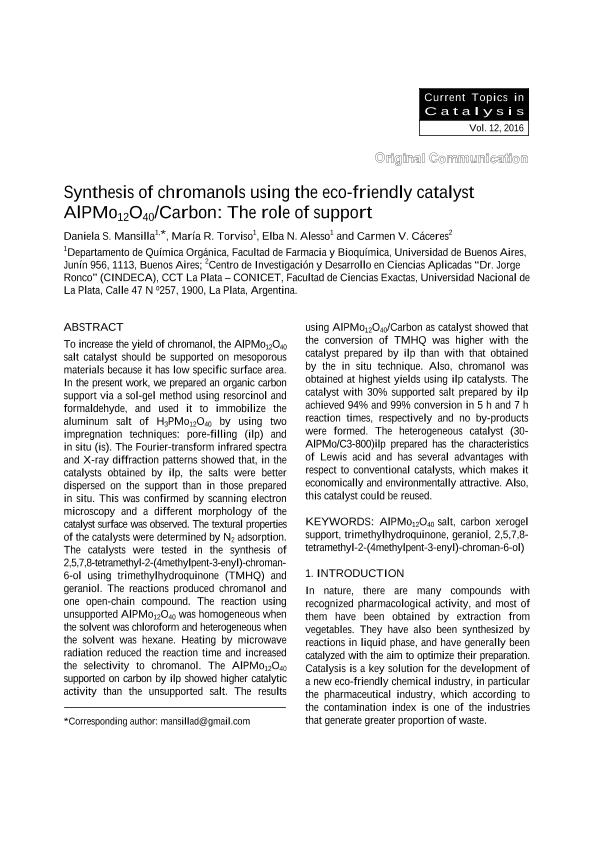Mostrar el registro sencillo del ítem
dc.contributor.author
Mansilla, Daniela Soledad

dc.contributor.author
Torviso, Maria del Rosario

dc.contributor.author
Alesso, Elba N.
dc.contributor.author
Caceres, Carmen Victoria

dc.date.available
2018-03-20T18:56:37Z
dc.date.issued
2016-03
dc.identifier.citation
Mansilla, Daniela Soledad; Torviso, Maria del Rosario; Alesso, Elba N.; Caceres, Carmen Victoria; Synthesis of chromanols using the eco-friendly catalyst AlPMo12O40/Carbon: The role of support; Research Trends; Current Topics in Catalysis; 12; 3-2016; 61-74
dc.identifier.issn
0972-4508
dc.identifier.uri
http://hdl.handle.net/11336/39398
dc.description.abstract
To increase the yield of chromanol, the AlPMo12O40 salt catalyst should be supported on mesoporous materials because it has low specific surface area. In the present work, we prepared an organic carbon support via a sol-gel method using resorcinol and formaldehyde, and used it to immobilize the aluminum salt of H3PMo12O40 by using two impregnation techniques: pore-filling (ilp) and in situ (is). The Fourier-transform infrared spectra and X-ray diffraction patterns showed that, in the catalysts obtained by ilp, the salts were better dispersed on the support than in those prepared in situ. This was confirmed by scanning electron microscopy and a different morphology of the catalyst surface was observed. The textural properties of the catalysts were determined by N2 adsorption. The catalysts were tested in the synthesis of 2,5,7,8-tetramethyl-2-(4methylpent-3-enyl)-chroman-6-ol using trimethylhydroquinone (TMHQ) and geraniol. The reactions produced chromanol and one open-chain compound. The reaction using unsupported AlPMo12O40 was homogeneous when the solvent was chloroform and heterogeneous when the solvent was hexane. Heating by microwave radiation reduced the reaction time and increased the selectivity to chromanol. The AlPMo12O40 supported on carbon by ilp showed higher catalytic activity than the unsupported salt. The results using AlPMo12O40/Carbon as catalyst showed that the conversion of TMHQ was higher with the catalyst prepared by ilp than with that obtained by the in situ technique. Also, chromanol was obtained at highest yields using ilp catalysts. The catalyst with 30% supported salt prepared by ilp achieved 94% and 99% conversion in 5 h and 7 h reaction times, respectively and no by-products were formed. The heterogeneous catalyst (30-AlPMo/C3-800)ilp prepared has the characteristics of Lewis acid and has several advantages with respect to conventional catalysts, which makes it economically and environmentally attractive. Also, this catalyst could be reused.
dc.format
application/pdf
dc.language.iso
eng
dc.publisher
Research Trends
dc.rights
info:eu-repo/semantics/openAccess
dc.rights.uri
https://creativecommons.org/licenses/by-nc-sa/2.5/ar/
dc.subject
Cromanos
dc.subject
Sales de H3pmo12o40
dc.subject
Soporte Gel de Carbón
dc.subject.classification
Otras Ciencias Químicas

dc.subject.classification
Ciencias Químicas

dc.subject.classification
CIENCIAS NATURALES Y EXACTAS

dc.title
Synthesis of chromanols using the eco-friendly catalyst AlPMo12O40/Carbon: The role of support
dc.type
info:eu-repo/semantics/article
dc.type
info:ar-repo/semantics/artículo
dc.type
info:eu-repo/semantics/publishedVersion
dc.date.updated
2018-03-20T14:34:23Z
dc.journal.volume
12
dc.journal.pagination
61-74
dc.journal.pais
India

dc.description.fil
Fil: Mansilla, Daniela Soledad. Universidad de Buenos Aires. Facultad de Ciencias Exactas y Naturales. Departamento de Química Orgánica; Argentina. Consejo Nacional de Investigaciones Científicas y Técnicas; Argentina
dc.description.fil
Fil: Torviso, Maria del Rosario. Universidad de Buenos Aires. Facultad de Ciencias Exactas y Naturales. Departamento de Química Orgánica; Argentina. Consejo Nacional de Investigaciones Científicas y Técnicas; Argentina
dc.description.fil
Fil: Alesso, Elba N.. Universidad de Buenos Aires. Facultad de Ciencias Exactas y Naturales. Departamento de Química Orgánica; Argentina
dc.description.fil
Fil: Caceres, Carmen Victoria. Consejo Nacional de Investigaciones Científicas y Técnicas. Centro Científico Tecnológico Conicet - La Plata. Centro de Investigación y Desarrollo en Ciencias Aplicadas ; Argentina
dc.journal.title
Current Topics in Catalysis
dc.relation.alternativeid
info:eu-repo/semantics/altIdentifier/url/http://www.researchtrends.net/tia/abstract.asp?in=0&vn=12&tid=23&aid=5783&pub=2016&type=3
Archivos asociados
